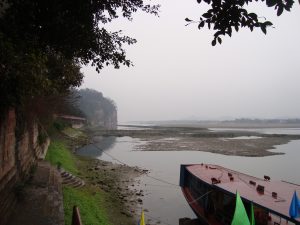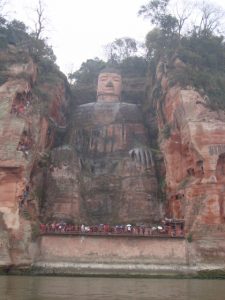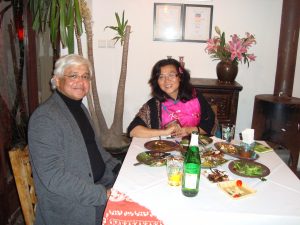I first met Lijia Zhang in 2010, at a literary event in Beijing.
She had then recently published a memoir (Socialism is Great!’ A Worker’s Memoir of The New China, 2008) about her extraordinary personal journey. Born into a working-class family in Nanjing she spent several years working in a factory. But her spare time was dedicated to learning English, which she did with such success that she was awarded a scholarship for a creative writing course in London.
That is where Lijia’s new book, Lotus (forthcoming 2017, Henry Holt & Co.) had its start. It is her first novel and she began it ‘while working for my MA in Creative and Life Writing at Goldsmith’s College, University of London.’ It is the story of a woman (the eponymous Lotus of the title) who leaves her birthplace, an impoverished mountain village in Sichuan, to travel to the boomtown of Shenzen, a thousand miles to the south.
As with so many rural migrants in Asia, Lotus’s desire for the city is sired by a neighbour’s television set. ‘Everyone had been so excited when her neighbor Luo Yijun’s family brought back a magic box called a dianshi – electric screen. The Luos’ yard was packed with enthusiastic viewers craning their necks for a better view of the moving pictures in the box. The unceasing stream of visitors bothered the family so much that they locked up the dianshi after a week and only took it out for public viewing during festivals. But Luo Yijun, her classmate, would invite Lotus to watch it from time to time. Once, they saw a show about Shenzen, the city just north of Hong Kong.
How glorious it looked! Palm trees, buildings clad in shining mirrors soaring into the sky, colorful neon signs dazzling to the eye, and large ships docking on blue water in a busy harbor.’
Every year, across Asia, millions of city-bound journeys are launched in exactly this way – and as happens only too often, Lotus’s move does not turn out as she had hoped. She finds out the hard way that “the city is a place where dragons and fish jumble together. Not a safe place for a young girl.” She ends up having to earn her living by selling her body.
The descriptions of Lotus’s life as a ji (‘chicken’ or prostitute) are remarkably persuasive – so much so that I wrote to Lijia to ask how she came by the details. I did an enormous amount of research, she wrote back. I tried to make friends with working girls. But they moved away, changed their numbers or simply vanished. Luckily I met Lanlan, a former prostitute who now runs a NGO dedicated to help female sex workers. She generously shared her experience with me and allowed me to work for her NGO, distributing condoms to the girls and hanging out with them. All the working girls are made-up characters, but many details are real.
One of the novel’s major characters is a photographer (Bing) who has made a specialty of photographing prostitutes. At one point he says to Lotus: ‘Migrant workers are China’s unsung heroes. Without their cheap labour…. there would not be China’s economic miracle.‘
This is indeed one of the principal themes of the novel, and it reflects Lijia’s own life experience: ‘Coming from a poor family myself I am interested in those ‘xiao ren wu’, ‘little people’, and their struggles. You may say I am a self-appointed spokesperson for China’s under-privileged. I want to explore the emotional costs of China’s rural-urban migration. By the way, a lot of sex workers in Shenzhen areas were former factory workers.’
In the novel Bing offers a slightly different explanation for his interest in ji: ‘Prostitution is a window through which to see the changes in this country.’
Bing is an idealist, a former campaigner for democracy. But he meets with several shocks when he visits Lotus’s village in Sichuan Province.
On the mud wall of her father’s house is a large portrait of Chairman Mao: It was dusty and fading, the mole under the Chairman’s chin looking more sinister than ever… In the bright morning sun it appeared so outdated that one could almost smell the mould. A memorial tablet for the ancestors and a porcelain statute of Guanyin made up a little shrine beneath the picture. What a strange combination of worship, Bing thought.
Bing’s scrutiny of the shrine does not go unnoticed by Lotus who says to her father: “Ba do you know which dynasty it is? Even Chairman Mao’s successor has died. When are you going to change the picture?”
‘Change the picture, why?’ her father countered. ‘Chairman Mao was the best emperor China ever had.’

Neither as a migrant nor as a prostitute does Lotus come across as a synthetically constructed composite. A fully rounded character, she is never depicted as a victim of circumstance. Ambitious and driven though she is, she also has some unexpected traits.

Leshan
She is deeply religious for one: “You see, my grandma is a Buddhist, murmuring amitabha all day long,” Lotus explains to Bing. “I used to laugh at her for being superstitious. Now look at me, praying to the Guanyin Buddha every day.”
Lotus also has a great respect for learning (she saves her earnings diligently in the hope of putting her younger brother through college). Books hold an almost talismanic fascination for her: ‘Lotus looked through the neatly piled books. She picked up The Portrait of a Lady and looked at the lady on the cover with her feathered hat. She remembered how Bing (the photographer) had described it as a story of a girl confronting her destiny. Now she understood it was all about the girl deciding her own life’.
It is impossible not to see in this an echo of Lijia’s own journey, as a young woman obsessed with books, drawing on foreign literary models in order to seize her destiny. The irony however is that the dream that lies at the heart of Lotus’s quest – and Lijia’s – is agelessly and quintessentially Chinese: it consists ultimately in a deep faith in the transformative power of education.
In its subject matter and the circumstances of its gestation Lotus is very much a novel of its times. Globalization is its backdrop and it is situated on the boundary of two languages – English and Chinese – that are increasingly thrust together because of those processes. This is a very difficult boundary to straddle and Lijia succeeds at it precisely because she eschews one of the most pervasive and pernicious literary consequences of contemporary globalization – the constant invocation of brand names and pop-culture. She opts instead to draw upon the immense resources of China’s literary heritage, of both the folksy and classical varieties (many of the chapter titles are derived from well-known sayings and proverbs).
Consider the following passages:
The journalist had apparently done his homework. “I’m sure you’re tired of this question, but how did you become interest in ‘willow trees on the roadside and flowers on the wall’?” he used an old poetic term for prostitutes.
They started to joke, at their clients’ expense, as usul. Xia got up, and with surprising comic flair, began to mimic a hesitant client. The man had walked up and down the street half a dozen times before eventually surrendering to her come-ons. “I know his type: wanting to have fun but he doesn’t have the balls to just ask for it. So I said: ‘Hey, honey, I’m a crack shot, good at ‘shooting down the airplane’ by hand’,” Xia laughed, pumping her hand up and down… (148)
What luck, this offer. A pancake fallen from the sky, as her grandma would say!
What kind of society has China become? … “Big fish eat small fish, and small fish eat shrimps.”
It was only a long slingshot away from East Station Road.
The scene was as chaotic as a disturbed beehive.
To be with him felt like cracking a plate off melon seeds – pleasant enough, but nothing too exciting.
“’Enemies and lovers are destined to meet again,’” she said, her fake eyelashes fluttering.
‘Once bitten by a snake, one shies at the sight of a coiled rope for the next ten years.’
As unnecessary as painting legs on a snake, Lotus thought.
‘A butcher can become a Buddha after dropping his knife.’
‘You ungrateful child. You simply don’t know how high heaven is.’
‘He used Lotus and us and then chucked us. He ate the meat and dumped the bone!’
At a time when the fields of reference available to fiction are increasingly in danger of being colonized by consumer culture and advertising slogans, how refreshing it is to come upon these universally comprehensible allusions!
What would be the journey of such a text were it to be translated into Chinese? Unfortunately we shall probably never know: according to Lijia a Chinese translation is unlikely ‘because I imagine the world I depicted would be too negative in the view of the authorities. Worse still I talked about 1989/Tiananmen, a taboo topic.’
Lotus is a wonderfully readable and perceptive novel about an aspect of contemporary China that remains largely invisible to the outsider. Although it pulls no punches it is saturated with the spirit of stoic optimism that sustains millions of rural migrants around the world.




Hi Amitav,
I remember meeting Lijia at the Jaipur Lit Fest in 2010 in rather unusual circumstances — while she was having a chat with Colin Thubron over lunch. I wanted to speak to Thubron and I remember her telling me: “People don’t know great a writer he is!”
I asked her where she lived (since most Chinese writers in English seem to live abroad ), and she quipped: “Where would a Chinese writer live? In China!” We three later talked a bit, as we ate — about Bruce Chatwin — and she later handed me her card, with the name of her new book — Socialism is Great!. I thought of interviewing her later but that day never came.
Best,
Sourabh